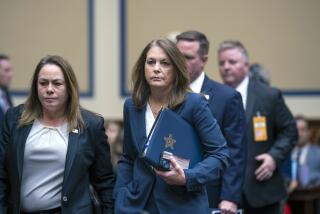No Bombshell, No Closure Either : House hearings fail to answer many questions about Waco
- Share via
After 10 days and more than 100 witnesses, the House joint hearings on the 1993 Branch Davidian calamity are over. Variously raucous, bitterly partisan, emotional and poignant, the hearings produced none of the promised bombshells--and ultimately no satisfying closure to this dreadful episode in which the elements of religious zealotry, child abuse, obsession with weapons and overbearing police force combined to produce disaster.
On one level, the hearings confirmed the obvious: First, that the Bureau of Alcohol, Tobacco and Firearms staged a badly designed raid on the doomsday cult’s Waco compound on Feb. 28, 1993, despite a clear warning it had lost the element of surprise. And second that the Federal Bureau of Investigation compounded the tragedy 51 days later by mounting what turned out to be an unnecessary tear gas attack whose end was the self-inflicted death of 80 sect members and children by fire.
NO PLOT UNEARTHED: If the purpose of the hearings was to demonstrate some government conspiracy to incinerate the compound, no evidence of that came out to feed the paranoid fantasies of the militia movement. If the purpose was to prove a cover-up of embarrassing facts about the ATF raid, only scant evidence emerged. If the purpose was to lay the groundwork for repeal of the assault weapons ban, then gun control opponents made bad PR for their cause by aligning themselves with the memory of David Koresh, the Davidians’ maniacal and sexually perverse religious leader, who both armed his followers with illegal weapons and bedded and spanked their little daughters. The testimony of 14-year-old Kiri Jewell, who described how Koresh raped her at age 10 in a Dallas motel and then read to her from the Bible, was not exactly what the Republicans had hoped for. The hearings were also tainted by the disguised involvement of the National Rifle Assn.
Clearly the hearings backfired for those Republicans who hoped the Clinton Administration would be embarrassed. With schoolmarm sternness and rectitude, Atty. Gen. Janet Reno stared down her critics on the House panel, even if her explanation of why she approved the tear gas attack was unconvincing. The hearings gave the Democratic Administration a golden political opportunity to stand shoulder to shoulder with law enforcement authorities.
WARNING IGNORED: However, many troubling questions were left unresolved: Did the FBI provide Reno with all the information she needed before the tear gas attack? Why did the negotiations with Koresh fail? Why did the ATF falsely claim the Davidians were making illegal drugs? Did interagency rivalries contribute to the calamity? How much responsibility can be traced to President Clinton? What has been done to prevent a recurrence of such an event?
Particularly troubling was the disclosure that the FBI agent in charge in Waco believed that there was a 99% chance that the Davidians would fire on the tanks discharging the tear gas. According to the plan, such gunfire would induce the FBI to accelerate the gas insertion, which otherwise was to be done slowly over 48 hours. Apparently Reno was not informed of the agent’s views; had she known she almost certainly would have vetoed the assault as likely to have a deadly ending. In any event, how could the FBI or Reno expect any other result from a military-like attack by authorities on a paranoid religious leader with fearsome visions of apocalypse?
The co-chairman of the hearings, Rep. Bill McCollum (R-Fla.), deserves credit for keeping them from becoming a circus and preventing less rational forces from taking control. But it will take yet another forum, at yet another time, to get at the underlying truth of Waco.
More to Read
Get the L.A. Times Politics newsletter
Deeply reported insights into legislation, politics and policy from Sacramento, Washington and beyond. In your inbox twice per week.
You may occasionally receive promotional content from the Los Angeles Times.










